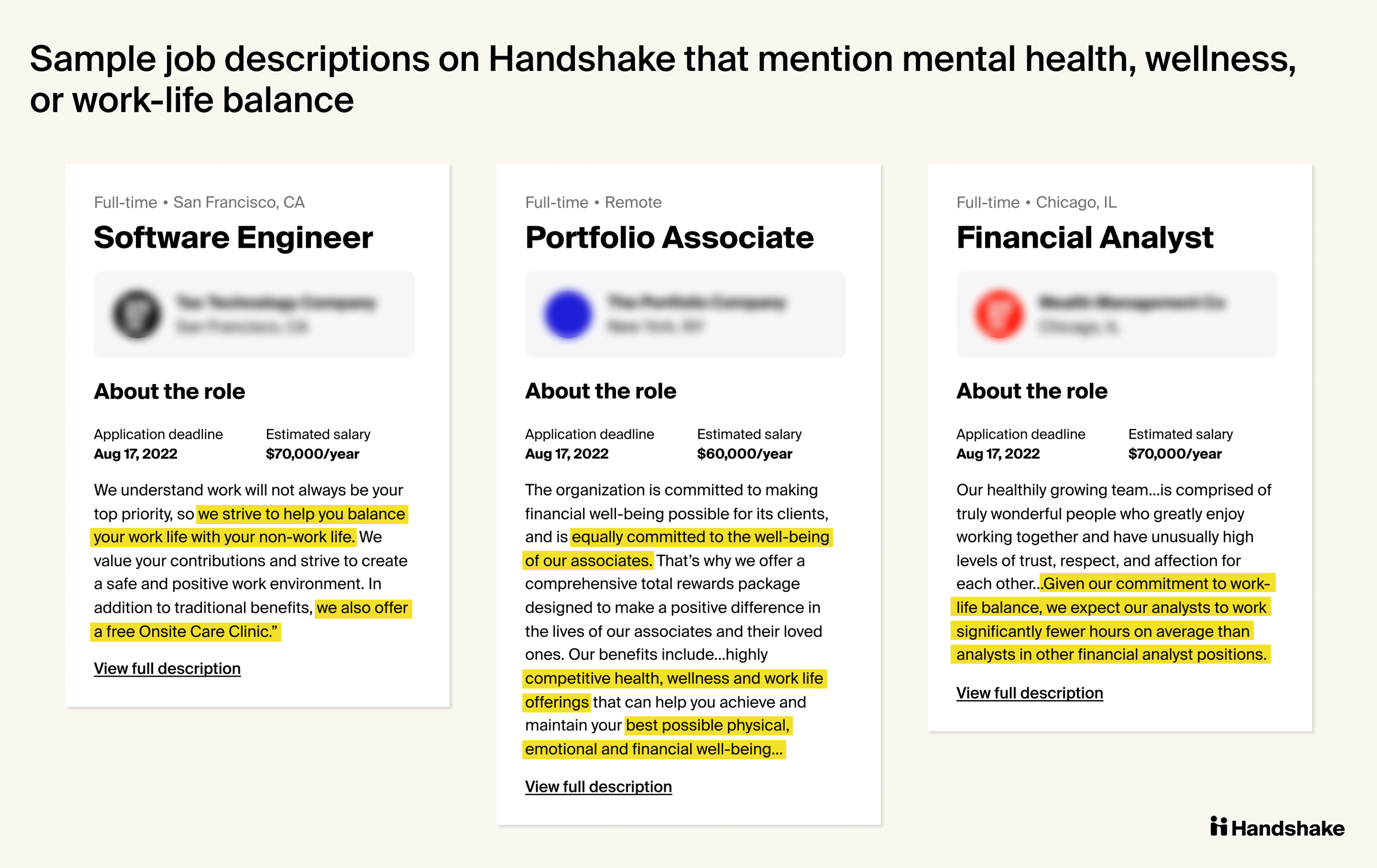Key takeaways
- The share of jobs mentioning wellness and mental health have doubled since 2019, and peaked in January 2021—the cruelest month for COVID-19 in the US since the pandemic first started in March 2020.
- Job posts for high stress or competitive roles that are more upfront about discussing mental health and wellness are seeing, in some cases, more than twice as many applications as similar job posts that do not mention mental health or wellbeing.
Has the pandemic motivated employers to respond to the mental health, wellness, and wellbeing demands of Gen Z?
The short answer is yes. We looked at both the prevalence of mental health and wellness-related keywords in jobs posts on Handshake as well as how Gen Z responds to employers that prioritize mental health and wellness when considering a place to work.
As a generation known for normalizing mental healthcare, Gen Z has made mental health a central part of their job search. According to a recent survey, 92% of college seniors believe employers should offer mental or emotional health benefits as part of their compensation package. Compared to previous generations, Gen Z is also more likely to have reported going to therapy, disrupting the long-held stigma that was once associated with seeking mental health support.
Read on for two key trends from Handshake’s network of 15M+ active students and recent grads that showcase how both employers and Gen Z job seekers are responding to the evolving needs of mental health and wellness in the workplace.
Unsurprisingly, support for mental health is far more prevalent in pandemic-era job descriptions.
An analysis of full-time job posts on Handshake since January 2019 reveals that mentions of wellness and mental health have doubled since before the pandemic. At the beginning of 2019, “work-life [balance]” outpaced “mental health” in the overall share of full-time job posts on the network, though this reversed shortly after the first COVID-19 stay-at-home order in March 2020. Mentions of “mental health”spiked at the beginning of 2021, reaching three times as many mentions compared to two years prior.
The rise in mental health as an aspect of job descriptions suggests that in the context of COVID-19, employers understood and prioritized concern for employee mental health to attract and engage potential applicants. By contrast, mentions of work-life balance, which held relatively steady throughout the pandemic, may have been perceived as less of an immediate selling point by employers, especially as remote and hybrid work environments became the norm.

How is Gen Z responding to employers that prioritize mental health and wellness?
It depends on the role. Among large employers with over 1,000 employees, most jobs mentioning wellness and mental health-related keywords—including mental health, wellness, and work-life—had an application rate (i.e., total applications per job) similar to those that did not.
However, some key exceptions emerge. For job roles with a reputation for having high-stress work environments (e.g., Investment Banking and Financial Sales Agents; Architects, Financial and Investment Fund Managers) and for those with highly competitive or in-demand skill sets (e.g., Software Developers and Software Engineers), jobs mentioning mental health and wellness keywords outperformed similar jobs that did not mention those terms by a sizable margin (in some cases, receiving more than twice as many applications).
This could be interpreted in a few ways. Job posts that mention mental health and wellness in their job descriptions are more attractive to students due to their explicit signaling of an employer investment in mental and emotional wellbeing. Alternatively, it could be that more desirable employers are more likely to offer wellness benefits and highlight steps taken to address burnout and the mental health of employees. In either case, job posts that are more upfront about discussing the mental health and wellbeing of employees are seeing greater attention (and more applications) from Gen Z.
Why are investment banking, architecture, and software engineering jobs seeing a greater application rate from Gen Z?
The tables below place these application rates in a larger context with industry-level trends that may be influencing this shift in Gen Z interest:
Closing
According to the American Psychological Association, Gen Z has disproportionately felt the impact of the COVID-19 pandemic and its associated disruptions: 84% of Gen Z adults reported experiencing some physiological impact from stress, suggesting that the desire for employers to provide support for employee mental health & wellness will continue to grow.
Data from the Handshake network shows that both employers and jobseekers are responding accordingly, particularly in sectors where retaining talent and reducing burnout are top-of-mind for employers. As with remote and hybrid work—once a perk provided by a limited number of employers or pertaining to certain types of roles—mental health and wellness benefits are quickly becoming must-haves for job seekers as they determine the first or next step in their career.
